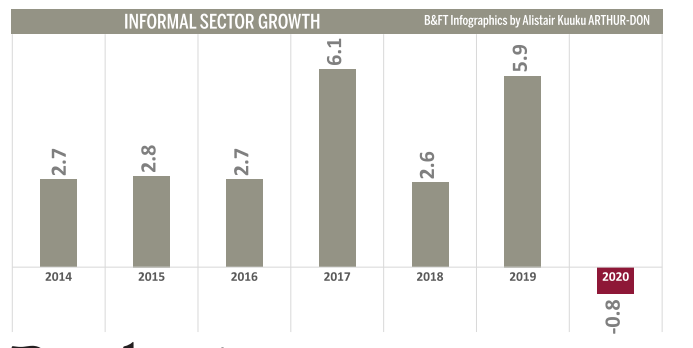…as it contracts by 0.8% in 2020
The largest sector of the country’s economy, the informal sector, has been hard-hit by the coronavirus pandemic’s impact – causing it to contract for the first time in many years, a development that has exposed the vulnerability of a sector many analysts think holds the key to boosting government revenue.
Ghana Statistical Service (GSS) data have revealed that the sector contracted by 0.8 percent in the first year of the pandemic (2020) – a sharp drop from an impressive 5.9 percent growth recorded in 2019, and indicating the pandemic had a great impact on the sector which is estimated to make up to 80 percent of the economy and where many Ghanaians find their bread and butter.
This comes as no surprise though, as the coronavirus pandemic led to a general slowdown of economic activities and, further, changed the way business is done in the country. The entire economy grew by just 0.4 percent in 2020 against a revised government target of 1.9 percent due to restrictions introduced both locally and globally on trade and the movement of people.
The informal sector’s contribution to the economy also dropped to 24.9 percent in the period compared with the 25.5 percent in 2019 and 27.1 percent in 2018: a sure cause for worry if government is to listen to calls to expand the tax base to cover the sector, as the data may well explain that the informal economy is not as robust as envisioned.
During the heat of the pandemic when some players in the formal sector were coming out with innovative ways of remaining in business in the midst of the turmoil through the heavy use of technology, players in the informal sector lacked the resources and knowledge to invest in IT infrastructure to turn their fortunes around.
Then again, some of businesses in the informal sector are sources of supply for raw materials and other supplies needed by the formal sector. Hence, any negative impact on the formal sector will automatically transcend to the informal sector.
Commenting on this, Director at the Institute of Social, Statistics and Economic Research (ISSER) of the University of Ghana, Prof. Peter Quartey, said contraction of the informal sector can be attributed to the general economic slowdown and the sector’s inability to adjust to the ‘new normal’ like the formal sector did; especially when the lifestyles of many Ghanaians have changed.
“Due to the general economic slowdown, which has resulted in high cost of living, people have cut down on spending. And once the informal sector is part of the economy, it will also be affected. And again, some of the services the informal sector provide are now available online. For example, people no longer feel comfortable to buy something and eat in traffic when they can place an order online for it,” he said in an interview with the B&FT.
He added that for the sector to come back strongly from impacts of the pandemic, it will be imperative for players to adapt to the new normal and change their way of doing business to suit consumers’ needs.
“The informal sector must be adaptive to change. COVID has taught all of us lessons. Now the way we do business is changing. People are moving toward digital now, and so those in the informal sector must start moving toward that direction. For example, if you are into distribution, you can now start marketing your products online rather than carrying them around to people,” he said in an interview with the B&FT.
The informal sector was not the only one to suffer contraction in the pandemic year. The Industrial sector got the sharpest bite of all, as it contracted by 3.6 percent – a sharp nose-dive from its 6.4 percent growth recorded the previous year.
The services sector – which has been the main driver of growth for the country over many years and is also the largest sector in the economy – also saw its slowest growth since 2014, recording 1.5 percent as against 7.6 percent in 2019. Then agriculture – the sector often neglected by both government and the financial sector – pulled a surprise by growing at an impressive rate of 7.4 percent; the best it has ever seen since the rebasing year.










